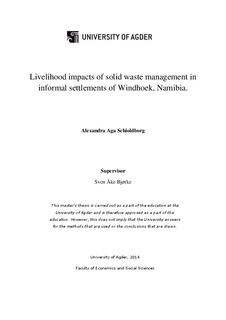| dc.description.abstract | Solid waste management (SWM) is a growing global concern, especially in urban areas and
even more so in urban areas of developing countries. Informal settlement areas, slums, face
grave challenges of inadequate municipal service delivery. The impact of solid waste
management is related to impacts caused by lacking water and sanitation, through the
common issue of public health. Service delivery varies among the residents within a city, and
reflects the historical background and the current priorities of the municipality. Livelihood
opportunities in the informal settlements are shaped by the organisation of urban space,
setting the preconditions for access to services, level of inclusion in decision-making and
forming of the ‘social self’.
This paper investigates the solid waste management system within the capital of Namibia,
Windhoek, with a special focus on the informal settlement areas. The direct livelihood
impacts of inadequate SWM and general service delivery are visible through unhealthy living
environments. The physical surroundings reflect the marginalised and peripheral status of the
informal and illegal settlers in Windhoek. The residents’ awareness of connections between
waste and livelihood varies, and is often limited to concrete issues in the neighbourhood, and
not to structural arrangements and inequities within Windhoek.
The research finds a divided city, where the traditional apartheid neighbourhoods are growing
into large informal settlements due to continual urban migration. These settlements located in
north-western Windhoek present the municipality with vast challenges related to basic service
delivery. The residents are aware of their low priority in the city, which impact negatively on
their livelihood opportunities.
Key words: waste, solid waste management, livelihoods, ‘social self’, Namibia, Windhoek, municipal
service delivery, informal settlements, slum. | nb_NO |
